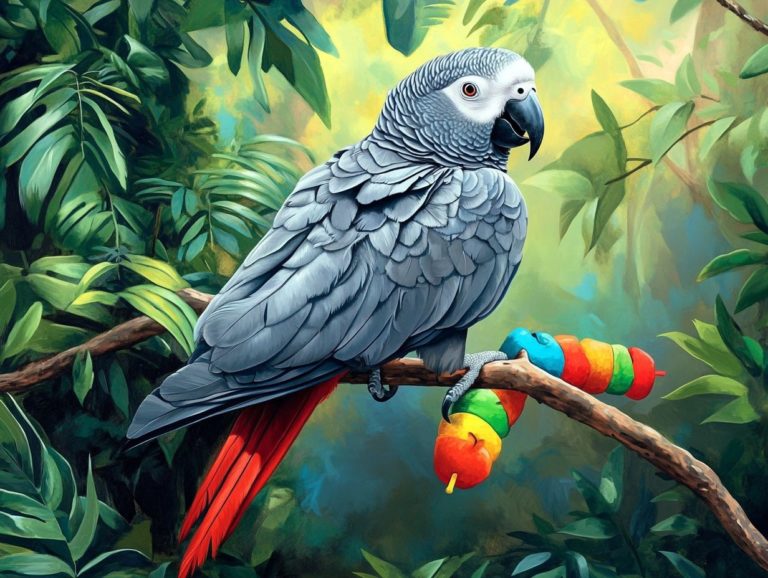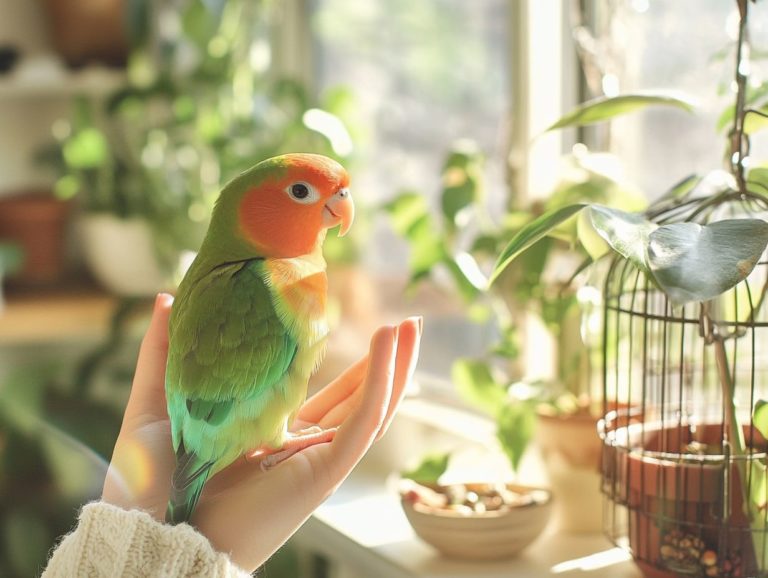How to Set Up a Finches Habitat
Finches are enchanting, sociable birds celebrated for their vivid colors and joyful melodies. Crafting the ideal habitat for these spirited creatures is vital for their health and contentment.
This guide provides essential steps to establish a finch-friendly environment, addressing everything from selecting the perfect cage and necessary accessories to maintaining optimal temperature and nutrition.
Whether you re a novice pet parent or seeking to elevate your finches’ living space, you ll discover valuable tips to cultivate a flourishing habitat.
Contents
- Key Takeaways:
- Choosing the Right Cage
- Essential Accessories for a Finch s Habitat
- Creating a Comfortable Environment
- Feeding and Nutrition for Finches
- Cleaning and Maintenance of the Habitat
- Frequently Asked Questions
- What are the basic requirements for setting up a finches habitat?
- What type of cage is suitable for finches?
- What should I use for perches and nesting areas in a finches habitat?
- What kind of food should I provide for my finches?
- How important is proper lighting and temperature for finches?
- Do I need to provide any special care for finches?
Key Takeaways:
What Are Finches?
Finches are small, social birds from the family Fringillidae, which includes popular species like the zebra finch, Gouldian finch, orange weaver finch, society finch, and spice finch. Known for their vibrant colors and melodious songs, these delightful creatures have captured the hearts of bird enthusiasts and pet parents alike.
Their lively nature and adaptability make them ideal companions in various environments, whether in the wild or as cherished pets. These charming birds exhibit fascinating social behaviors, forming tight-knit flocks that provide companionship and a sense of security.
In their natural habitats, finches prefer open woodlands, grasslands, and gardens, where they can forage for seeds and insects. Their diets vary slightly by species; for instance, the Gouldian finch thrives on a mixture of seeds, while the zebra finch has a fondness for grasses.
It s essential to pay attention to their social needs. Keeping finches in pairs or groups can significantly enhance their well-being. Their vibrant plumage and unique vocalizations not only enchant pet owners but also serve as natural adaptations to attract mates in their native habitats.
Choosing the Right Cage
When choosing the ideal cage for your finches, consider essential factors like cage size, materials, and any additional features that will create a safe and comfortable environment for your birds.
The cage should offer ample space for exercise and social interaction, all while being easy to clean and maintain. These considerations will significantly enhance the health and well-being of your finches, ensuring they thrive in their new home.
Size, Material, and Features
The size and material of your finches’ cage are critical for their well-being, influencing their comfort, safety, and overall health. A spacious cage promotes ample exercise and enhances socialization among your feathered friends.
Choosing non-toxic materials is essential to create a safe haven for your pet birds. For example, if you’re housing a small species like the Gouldian finch, aim for a cage that measures at least 30 inches in width, 18 inches in depth, and 18 inches in height. This will ensure they have enough room to fly and climb.
Larger species, such as the zebra finch, thrive in cages that measure 36 by 24 by 24 inches or larger. Prioritize high-quality stainless steel or untreated wood for materials to prevent harmful chemicals from leaching into their environment.
Look for features like bar spacing, which refers to the distance between the bars of the cage and should ideally be between 1/2 inch to 5/8 inch to keep your finches secure. Also, find easy-access doors and reliable safety locks to ensure those curious little beaks remain safely within their cozy home.
Essential Accessories for a Finch s Habitat
Transform your finches home into a vibrant paradise with essential accessories like perches, feeders, and toys. These elements are crucial for keeping your birds active and mentally stimulated.
Not only do they elevate the aesthetic of their living space, but they also significantly contribute to your birds’ social interactions and overall well-being.
By following these steps, you’ll ensure your finches live their happiest, healthiest lives. To get started, learn how to set up the perfect bird aviary and build their dream home today!
Perches, Feeders, and Toys
Providing appropriate perches, feeders, and toys is crucial for your finches’ well-being. These essentials encourage interaction and exploration.
Natural wood perches are a favorite among finches. Their irregular shapes and non-slip surfaces mimic a realistic setting.
Adding rope perches promotes climbing and allows you to hang them at various heights to encourage exercise. Varying the thickness of these perches supports foot health, enabling the birds to grip effectively.
Using diverse feeder types like tube and platform feeders ensures convenient access to seeds while fostering social interaction among your finches. To tap into their playful nature, consider introducing toys that promote problem-solving or have swinging mechanisms; these can keep your finches active and engaged.
Creating a Comfortable Environment
A cozy home is key to keeping your finches happy! Managing factors like temperature, humidity, and lighting is important.
By replicating their natural habitat, your birds will thrive and show their natural behaviors, bringing joy to your space.
Temperature, Humidity, and Lighting
Maintaining the right temperature, humidity, and lighting in your finches’ habitat is essential for their overall well-being. This environment profoundly impacts their health and behavior.
Aim for an ideal temperature range between 65 F and 75 F, with humidity levels around 40-60%. Remember, sudden shifts in these conditions can induce stress, so make gradual adjustments for their comfort.
Incorporating a proper lighting schedule is crucial. Using lights that imitate sunlight enhances their vitamin D absorption, promoting stronger bones and healthier plumage. A 12 to 14-hour light cycle mimics natural daylight and encourages optimal activity levels throughout the day, allowing them to exhibit their instinctual behaviors.
Feeding and Nutrition for Finches
Feeding is essential for your finches health and longevity. A well-balanced diet keeps them vibrant and energetic.
Offer a diverse array of food options high-quality seeds, fresh fruits, and vegetables, along with calcium and egg food. This variety keeps them happy and healthy!
Recommended Diet and Supplements
Your finches thrive on a diet rich in high-quality seeds and fresh produce. Offer millet, delightful treats, and calcium sources to keep them healthy.
Introduce seeds like canary, safflower, and sunflower alongside finch-specific pellets. Fresh fruits such as apples, berries, and bananas, paired with leafy greens, provide essential vitamins and hydration.
Don t forget about occasional treats like mealworms or commercial bird snacks, which add excitement to their diet while providing a boost of protein. Use calcium supplements especially during molting or breeding seasons to strengthen their bones and promote healthy feather development.
By ensuring a varied diet, you can engage their foraging instincts and keep them happily nourished, which is essential for their health.
Cleaning and Maintenance of the Habitat
Regularly cleaning and maintaining your finches’ habitat is essential for their health and plays a vital role in preventing the spread of disease. A pristine environment enhances the well-being of your birds and fosters a happier living space for both you and your finches.
Best Practices for a Healthy Habitat
Implementing best practices for cleaning and maintaining your finches’ habitat creates a safe, healthy, and stimulating environment for your feathered friends. By sticking to a regular cleaning routine and utilizing the right supplies, you can help prevent illness and enhance the overall well-being of your finches.
One key aspect of this maintenance is to regularly sanitize food and water dishes. Make it a habit to clean these daily for their health! This helps eliminate harmful bacteria that could compromise their well-being.
Change the bedding every week to keep your finches healthy! This reduces the risk of mold and unwanted pests, ensuring a more hygienic space for your birds.
Inspect toys for wear and tear. Replace them if necessary to ensure safety and keep your finches engaged. By closely monitoring these areas, you can ensure that your finches remain vibrant and healthy, as cleanliness is directly linked to their overall well-being.
Frequently Asked Questions
What are the basic requirements for setting up a finches habitat?
To set up a proper habitat for finches, you will need:
- A cage or aviary with enough space for the birds to fly and move around
- Perches and nesting areas
- Appropriate food and water sources
- Proper lighting and temperature control
What type of cage is suitable for finches?
Finches need a cage with horizontal bars that are spaced close enough together to prevent escape. The cage should also provide enough space for climbing and flying. A cage with a sliding bottom tray for easy cleaning is ideal.
What should I use for perches and nesting areas in a finches habitat?
For perches, use natural branches or wooden dowels that are thick enough for finches to comfortably grip. For nesting areas, provide materials such as soft nesting fibers or dry grass for them to build their nests.
What kind of food should I provide for my finches?
Finches need a balanced diet of:
- Seeds
- Pellets
- Fresh fruits and vegetables
You can also offer occasional treats like boiled eggs or mealworms. Remember to regularly clean and refill their food and water dishes to prevent contamination.
How important is proper lighting and temperature for finches?
Finches need exposure to natural sunlight or a full-spectrum light source, which mimics natural sunlight, for at least 12 hours a day to maintain their physical and mental well-being. The ideal temperature for finches is between 65-75 degrees Fahrenheit, so ensure their habitat is in a stable environment away from drafts.
Do I need to provide any special care for finches?
Aside from providing a suitable habitat, regularly clean and maintain their cage, provide fresh water and food, and monitor their health. It is also recommended to have at least two finches since they are social birds that thrive in pairs or small groups.
Start cleaning and refreshing your finches’ space today for a happier, healthier life!




